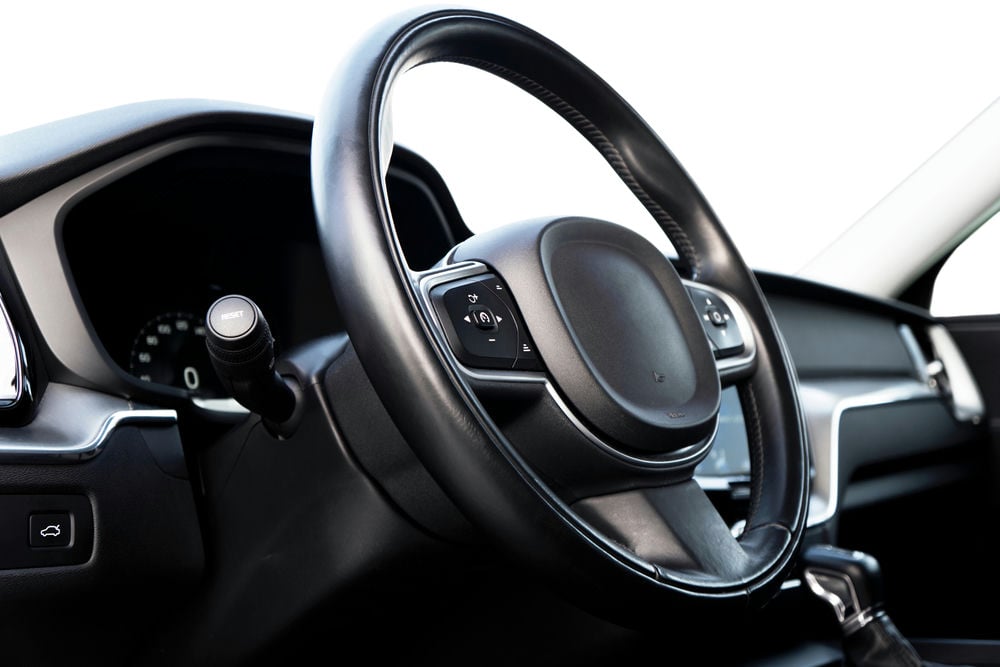The steering wheel is one of the most critical components in any car. It
controls the direction of the car's movement by turning the front wheels
left or right. But are they universal?
No, steering wheels are not universal. Steering wheels can vary from
one car model to another in terms of size, shaft diameter, number of
splines, and how the airbag is fitted. In addition, the construction of
the steering column and the bolt pattern holding it in place also
varies between aftermarket steering wheels.
So how can you know what steering wheel fits your car and which one to buy
as a replacement?
 Steering wheels are not universal.
Steering wheels are not universal.
How Do I Know What Steering Wheel Fits?
The steering wheel only fits when it has a compatible bolt pattern with
your car's hub.
Also known as Pitch Circle Diameter (PCD), the bolt pattern is the
specification of how a steering wheel attaches to the hub in your vehicle.
The terms refer to the diameter of an imaginary circle that the center of
the wheel lugs form.
Any steering wheel you choose must have a compatible PCD specification to
fit your car. The different options currently available on the market
include the following:
-
3 x 1.75-inch PCD means 3 wheel lugs arranged around a 1.75-inch
diameter circle.
-
5 x 2.75-inch PCD means 5 bolt holes placed around a 2.75-inch circle.
-
6 x 70 mm PCD measures 70 mm in diameter and has 6 wheel lugs.
-
6 x 74 mm PCD has 6 wheel lugs arranged in a circle measuring 74 mm in
diameter.
-
6 x 2.75-inch PCD consists of a 2.75-inch circle with 6 bolt holes.
 Steering wheel sizes depend on the make and model of the vehicle.
Steering wheel sizes depend on the make and model of the vehicle.
Suppose the steering wheel you want to purchase does not have a compatible
bolt pattern. In that case, many aftermarket steering wheel manufacturers
also supply PCD or hub adapters that can safely modify the bolt pattern of
your vehicle's hub to suit the steering wheel that you want to install.
How Do I Know What Steering Wheel To Buy?
You can find out what steering wheel to buy by looking at
the following aspects:
-
Bolt Pattern
: You should buy a wheel compatible with the bolt pattern in your
vehicle's hub; otherwise, you'll need to use a hub adapter to make it
fit.
-
Shape
: You can choose between round, open-top, and flat-bottom wheels.
Open-top steering wheels improve gauge visibility in dedicated track
cars. Buy a flat bottom steering wheel to clear up more leg room to get
in and out of the vehicle easily. The factory steering wheel on most
passenger cars is round in shape.
-
Size
: Aftermarket steering wheels usually range from 14.5 to 16 inches in
diameter. Smaller wheels free up more cabin space and have faster
steering inputs. Larger steering wheels may occupy more room but
provide a more effortless steering experience.
-
Dish
: Dish is the measurement of the distance between the centerline of the
steering wheel and the mounting surface. A deep dish steering wheel
sits close to you, while flat wheels remain far and are more
comfortable.
-
Grip Circumference
: The steering wheel grip circumference does not matter from the
performance perspective. You can buy a steering wheel that you can grip
most comfortably.
Do All Steering Wheel Covers Fit All Cars?
No, not all steering wheel covers fit all cars.
For example, most steering wheels range from 14.5 to 16 inches in diameter.
Hence, most steering wheel covers are also sold in corresponding sizes.
You should measure your steering wheel with a tape measure to find its
diameter and choose a steering wheel cover in the correct size.
Alternatively, check our steering wheel size data or other sites that provide steering wheel sizes.
Final Thoughts
The steering wheel is essential for a car to operate smoothly. Replacing a
worn-out steering wheel is necessary for a smooth driving experience.
When looking at replacement steering wheels, choose a model with a bolt
pattern compatible with your vehicle's hub. Or you'll need to use a PCD
adapter to make it fit.
If you don't like the way your existing steering wheel looks, you can use a
steering wheel cover to make it look different. Just be sure to choose one
in the correct size.